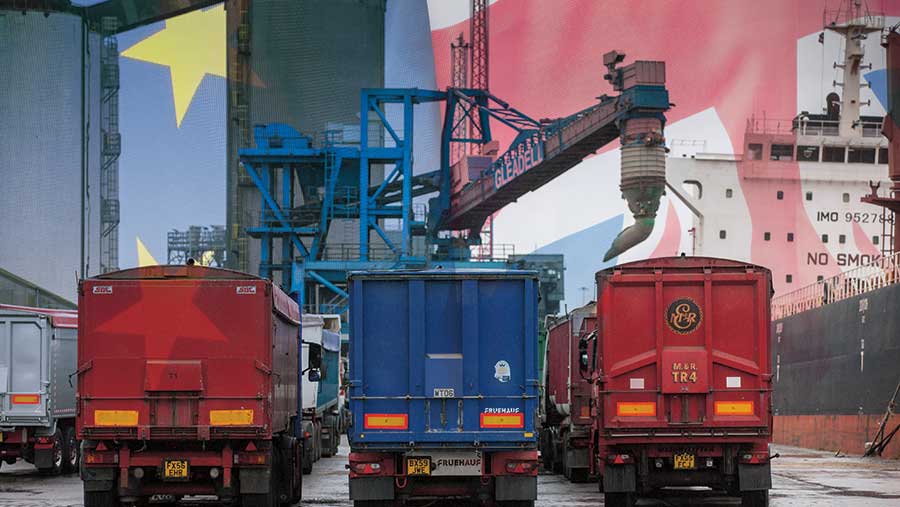Farmers told to prepare for trade pain outside single market
 © Tim Scrivener
© Tim Scrivener Leaving the Single European Market will present many challenges post Brexit, with the cost of trade likely to increase and the logistics of moving goods to our nearest neighbours set to become more complex.
Addressing a Brexit briefing organised by EU media group Euractiv in London on 9 March, NFU strategy director Martin Haworth said there were more threats than opportunities in relation to trade.
Even if government was able to negotiate a customs agreement with the EU, avoiding the imposition of tariffs, transactional costs would still amount to 5-8%, which would weigh down on farm prices.
See also: Three options for post-Brexit farm support explained
The reintroduction of border controls would also provide plenty of scope for disruption to trade.
Mr Haworth recalled past “lamb wars” with France (in which the French had blockaded shipments from the UK in 1990 due to low prices).
“None of that has happened since we’ve had the single market,” he said.
Mr Haworth also warned of the challenge of getting agriculture included in any future Free Trade Area, pointing out that food and farming was always a problem area in such trade talks.
The EU and the UK had different priorities, he added, with the EU focussed on agriculture and the UK more concerned about financial services.
Failure to secure a deal with the EU could see the UK reverting to World Trade Organization trade rules, which would be very damaging in terms of selling to key markets in Europe.
Opportunities
These concerns were echoed by Peter Hardwick, head of international trade development at AHDB.
While he acknowledged there were opportunities to develop business outside the EU, securing such deals would require sanitary and phytosanitary agreements. “These take years to develop and agree,” he said.
There were also issues of perishability to consider, when looking to sell farm produce to more distant markets.
“It is a difficult and long-term project to develop new markets overseas,” said Mr Hardwick. “Continued access to the EU market remains crucial.”
But Lord Teverson, chairman of the EU Energy and Environment sub-committee in the House of Lords was more upbeat, pointing out that the UK remained an attractive market, with more than 60 million relatively affluent consumers.
“There has to be some leverage in that,” he said.
Senior executive with sugar refiner Tate & Lyle, Gerald Mason, also played down the challenges of trading with the rest of the world, suggesting the costs were quite low once the processes were mastered. “It’s not as scary as you may think,” he said.
What else was said about Brexit?
On funding
“The EU sets a seven-year budget for agricultural support. Under a UK policy, the budget would be annual. It will only take a crisis in some other sector for the farm budget to be cut – and once it’s gone, it won’t be coming back.”
Alan Jago, European Young Farmers Association
“The money available to agriculture will be driven by the Treasury, not by any trade deals. The chancellor is very conservative in terms of expenditure and this is one area where savings can be made. Enjoy it while you’ve got it. ”
Lord Teverson, House of Lords
On timing
“The European Parliament will have a vote on the deal. But it will have to agree to the terms of the divorce before we can negotiate a trade agreement.”
Molly Scott Cato, MEP for South-West England and Gibralta
On impact
“If we get tariffs on milk, that will add 4-5p/litre to costs. The consumer won’t pay the extra, so it will be passed back down the chain to the farmer.”
Alan Jago, European Young Farmers Association
“The sheep sector will be the most affected by losing access to the single market, as 96% of all exports are to the EU. The sector needs to step up its efforts to inform people just how valuable sheep production is – to the economy, the environment and society.”
Phil Stocker, National Sheep Association
On World Trade Organization rules
“There will need to be a reallocation of tariff rate quotas (TRQs) post Brexit, (for example, for New Zealand lamb and butter). It is likely the New Zealanders will want to keep their full TRQs to the EU, and negotiate new ones with the UK. As for levels of support, that is less of a concern as most UK support is currently non-trade distorting, and that is likely to remain the case post Brexit.”
Martin Haworth, NFU
